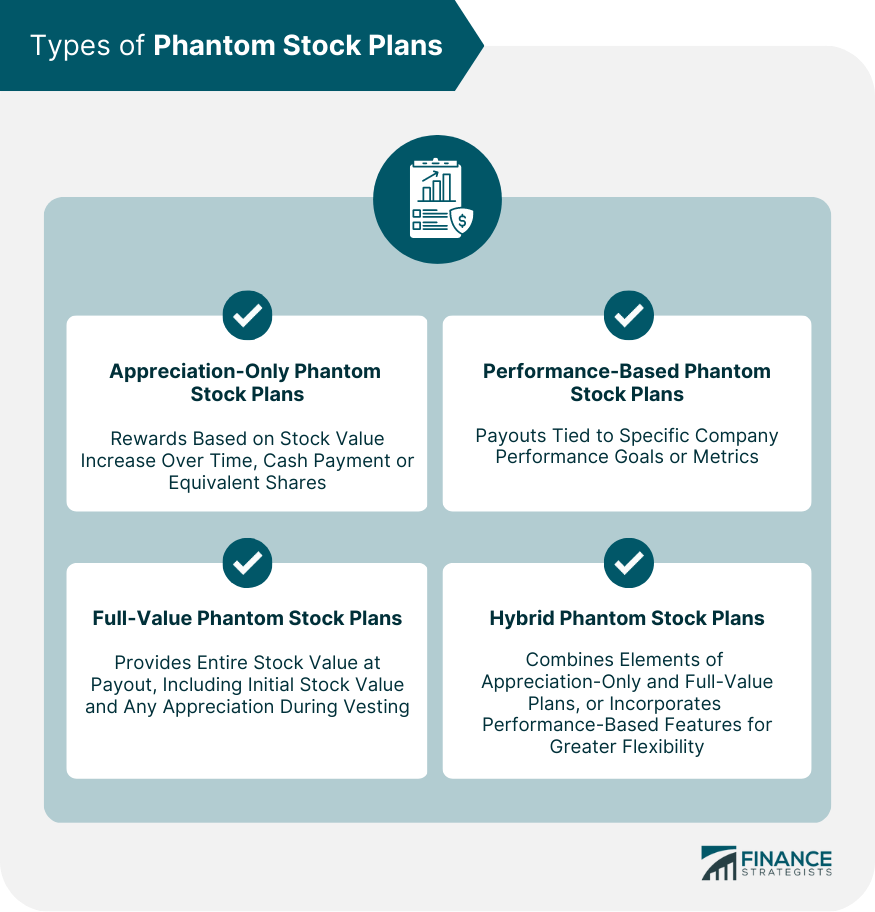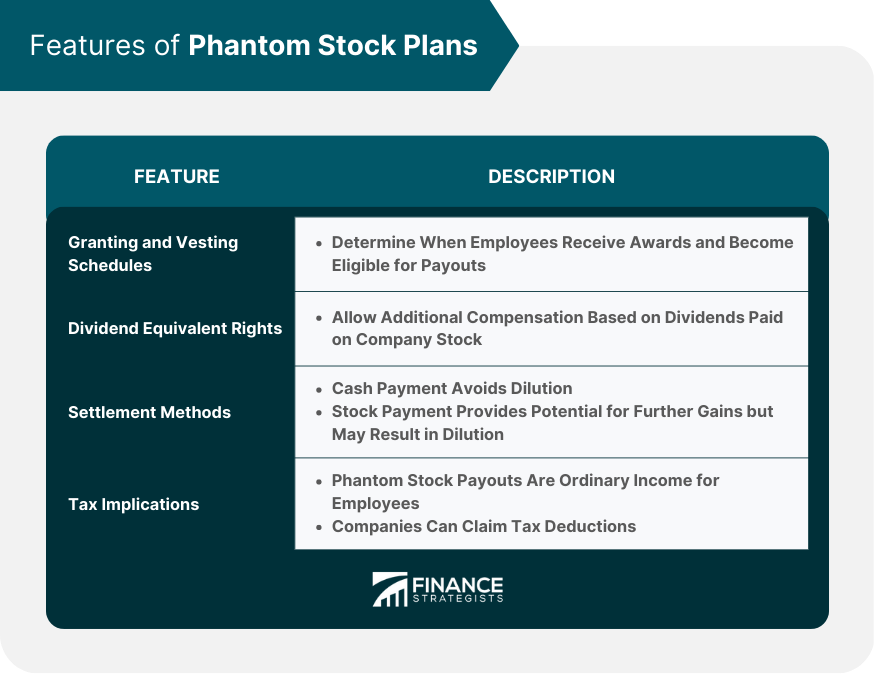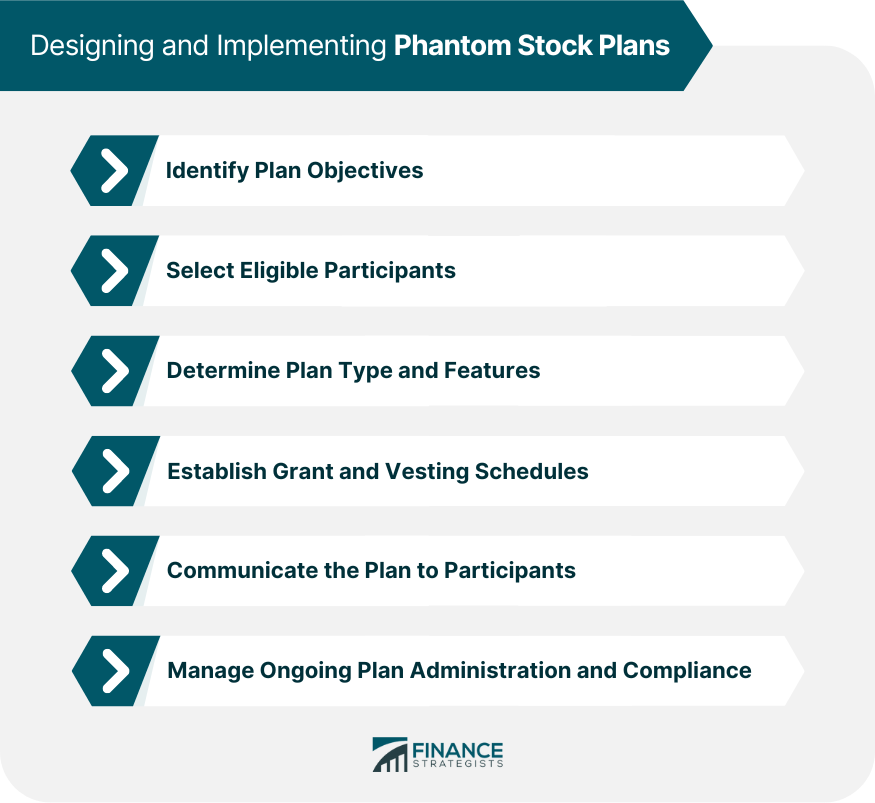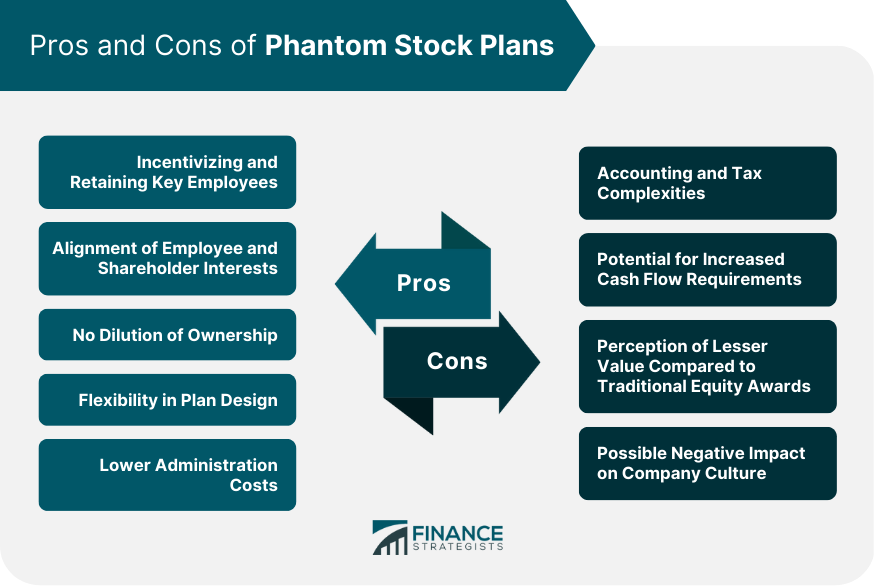Phantom stock plans are employee compensation plans that provide the benefits of owning company stock without transferring shares. These plans grant employees the right to receive a cash payment or equivalent shares based on the value of company stock at a future date. The main purpose of phantom stock plans is to incentivize and retain key employees by aligning their interests with those of shareholders. These plans provide employees with the potential for financial gain as the company's stock value increases without diluting ownership or incurring the same costs as traditional equity awards. Phantom stock plans differ from traditional stock options and restricted stock units (RSUs) in several ways. Stock options give employees the right to purchase shares at a predetermined price, while RSUs are grants of actual shares. Phantom stock plans provide only the economic benefit of owning shares without transferring ownership. Appreciation-only phantom stock plans are designed to reward employees based on the company's stock value increase over time. Participants receive a cash payment or equivalent shares equal to the difference between the stock's value at grant and its value at vesting or payout. Full-value phantom stock plans provide employees with the entire value of the underlying company stock at the time of payout. This includes both the initial stock value at the grant and any appreciation that occurs during the vesting period, resulting in a potentially larger payout for participants. Performance-based phantom stock plans tie payouts to the achievement of specific company performance goals or metrics. These plans can help align employee efforts with strategic objectives and ensure that rewards are tied to the overall success of the company. Hybrid phantom stock plans combine elements of both appreciation-only and full-value plans or incorporate performance-based features. These plans offer greater flexibility in structuring employee rewards and can be tailored to meet the unique needs of individual companies. Phantom stock plans typically include granting and vesting schedules, which determine when employees receive their awards and when they become eligible to receive payouts. These schedules can be based on time, performance, or a combination of factors, allowing companies to customize their plans to meet specific objectives. Dividend equivalent rights (DERs) allow participants in phantom stock plans to receive additional compensation based on the dividends paid on the underlying company stock. This feature helps to further align employee interests with those of shareholders and can increase the overall value of the phantom stock awards. Phantom stock plans can use various settlement methods to distribute payouts to participants, including cash settlement and stock settlement. Cash settlement involves paying employees the value of their phantom stock awards in cash, typically based on the company's stock value at the time of payout. This method does not require the issuance of actual shares, thereby avoiding dilution of ownership. Stock settlement involves issuing actual shares of company stock to participants in lieu of cash payments. This method can provide employees with the potential for further gains if the stock value continues to increase but may result in a dilution of ownership for existing shareholders. Phantom stock plans have different tax implications for participants and companies than traditional equity awards. Generally, phantom stock payouts are treated as ordinary income for employees, while companies can often claim tax deductions for the payouts made under these plans. The first step in designing and implementing a phantom stock plan is to identify the company's objectives for the plan. This could include incentivizing and retaining key employees, aligning employee interests with shareholder interests, or managing ownership dilution concerns. Determining which employees will be eligible to participate in the phantom stock plan is a crucial decision. Companies should consider factors such as the employee's role, performance, and potential impact on the company's success when selecting participants. Companies must decide on the type of phantom stock plan that best suits their needs and any additional features they wish to include. This may involve selecting between appreciation-only, full-value, performance-based, or hybrid plans and incorporating features such as dividend equivalent rights or specific settlement methods. Establishing grant and vesting schedules is essential to designing a phantom stock plan. These schedules determine when employees receive their awards and when they become eligible to receive payouts and can be based on factors such as time, performance, or a combination of both. Effectively communicating the phantom stock plan to participants is critical to its success. Companies should provide clear and transparent information on the plan's features, benefits, and potential risks and ensure that employees understand how the plan aligns with the company's overall objectives. Once a phantom stock plan is implemented, companies must manage ongoing administration and ensure compliance with relevant laws and regulations. This may involve tracking grant and vesting schedules, calculating payouts, managing tax and accounting implications, and conducting regular plan audits. Phantom stock plans may be subject to securities laws and regulations, depending on the plan's structure and the company's jurisdiction. Companies should consult with legal counsel to ensure their plan complies with applicable securities regulations and any required disclosures or filings. Phantom stock plans have unique tax implications for both participants and companies, which must be considered during plan design and ongoing administration. Companies should consult with tax professionals to ensure their plan complies with relevant tax regulations and to minimize any adverse tax consequences for participants. Companies implementing phantom stock plans must comply with applicable accounting standards, such as recognizing the plan as a liability on their financial statements. Consulting with an accounting professional can help ensure that the plan is properly accounted for and complies with relevant accounting standards. Phantom stock plans may also be subject to employment laws, particularly in regard to anti-discrimination and equal pay requirements. Companies should consult with legal counsel to ensure their plan complies with applicable employment laws and does not inadvertently create disparities or discrimination among employees. Phantom stock plans are an effective tool for incentivizing and retaining key employees, as they offer the potential for financial gain based on the company's stock performance. This aligns employee interests with those of shareholders and encourages long-term commitment to the company. By tying employee rewards to the company's stock value, phantom stock plans help align employees' interests with those of shareholders. This can lead to increased employee motivation, as they share in the company's financial success. One advantage of phantom stock plans over traditional equity awards is that they do not result in dilution of ownership for existing shareholders. This can be particularly attractive to closely-held or family-owned businesses, where maintaining control of ownership is a priority. Phantom stock plans offer a high degree of flexibility in their design, allowing companies to tailor the plans to meet their specific needs and objectives. This can include customizing grant and vesting schedules, incorporating performance-based features, or creating hybrid plans. Compared to traditional equity awards, phantom stock plans can have lower administration costs as they do not require the issuance of actual shares. This can result in cost savings for the company while providing a valuable employee incentive. Phantom stock plans can present accounting and tax complexities for both companies and participants. Companies must account for phantom stock awards as a liability on their financial statements. At the same time, participants may face ordinary income tax on payouts rather than the more favorable capital gains tax treatment available with traditional equity awards. Phantom stock plans can increase companies' cash flow requirements, particularly if cash settlements are used for payouts. This can be a challenge for companies with limited cash reserves and may require careful planning and management to ensure sufficient funds are available when payouts are due. Some employees may perceive phantom stock plans as having lesser value compared to traditional equity awards, such as stock options or RSUs. This perception can be due to the lack of actual share ownership and the different tax treatment of payouts, which may affect employee satisfaction and engagement with the plan. If not carefully designed and communicated, phantom stock plans can have a negative impact on company culture. Employees may view these plans as favoring certain individuals or groups, leading to feelings of inequality or resentment among the workforce. It is crucial for companies to ensure transparency and fairness in the implementation of phantom stock plans to avoid such issues. Start-ups and small businesses can benefit from implementing phantom stock plans to attract and retain talent while managing ownership dilution concerns. These plans can be particularly appealing to early-stage employees, as they offer the potential for financial gains as the company grows and succeeds. Family-owned businesses often use phantom stock plans to incentivize and retain key non-family employees without diluting family ownership. This approach allows the company to align the interests of employees with those of family shareholders while preserving control of the business within the family. Non-profit organizations can use phantom stock plans as a tool to incentivize and retain key employees in the absence of traditional equity compensation. These plans can be structured to reward employees based on the organization's financial or performance metrics, helping to align employee interests with the organization's mission and goals. Publicly traded companies may also utilize phantom stock plans to incentivize and retain key employees while managing ownership dilution concerns. These plans can offer a flexible and cost-effective alternative to traditional equity compensation while still aligning employee interests with shareholder value. Phantom stock plans can be an effective employee compensation strategy, but understanding their benefits and drawbacks is crucial for companies. By evaluating their features, advantages, and challenges, companies can make informed decisions about whether to implement such a plan. Factors such as their objectives, employee demographics, industry, and legal and regulatory requirements should be considered to ensure the chosen plan meets the company's needs and complies with relevant laws. As companies seek innovative ways to attract and retain top talent, phantom stock plans and other equity compensation strategies will likely continue to evolve and gain popularity. However, due to their complexities, companies should seek the guidance of financial advisors, legal counsel, and tax professionals to ensure compliance with all regulations and meet their objectives.What Are Phantom Stock Plans?
Types of Phantom Stock Plans
Appreciation-Only Phantom Stock Plans
Full-Value Phantom Stock Plans
Performance-Based Phantom Stock Plans
Hybrid Phantom Stock Plans

Features of Phantom Stock Plans
Granting and Vesting Schedules
Dividend Equivalent Rights
Settlement Methods
Cash Settlement
Stock Settlement
Tax Implications for Participants and Companies

Designing and Implementing Phantom Stock Plans
Identify Plan Objectives
Select Eligible Participants
Determine Plan Type and Features
Establish Grant and Vesting Schedules
Communicate the Plan to Participants
Manage Ongoing Plan Administration and Compliance

Legal and Regulatory Considerations of Phantom Stock Plans
Securities Laws and Regulations
Tax Regulations
Accounting Standards
Employment Laws
Advantages of Phantom Stock Plans
Incentivizing and Retaining Key Employees
Alignment of Employee and Shareholder Interests
No Dilution of Ownership
Flexibility in Plan Design
Lower Administration Costs
Disadvantages and Challenges of Phantom Stock Plans
Accounting and Tax Complexities
Potential for Increased Cash Flow Requirements
Perception of Lesser Value Compared to Traditional Equity Awards
Possible Negative Impact on Company Culture

Phantom Stock Plans in Various Industries
Start-Ups and Small Businesses
Family-Owned Businesses
Non-profit Organizations
Publicly Traded Companies
Final Thoughts
Phantom Stock Plans FAQs
Phantom stock plans are a form of employee compensation that provide the financial benefits of stock ownership without actually granting shares. They are based on the value of a company's stock and typically pay out in cash or actual shares upon meeting certain conditions. Unlike traditional stock options, phantom stock plans do not involve the issuance of real shares, so they do not result in ownership dilution.
There are four main types of phantom stock plans: appreciation-only, full-value, performance-based, and hybrid plans. Appreciation-only plans provide gains based on the increase in the stock value, while full-value plans payout based on the entire value of the stock. Performance-based plans link payouts to specific performance metrics, and hybrid plans combine features of the other types to create a customized plan.
Phantom stock plans offer several advantages, including incentivizing and retaining key employees, aligning employee and shareholder interests, preventing dilution of ownership, providing flexibility in plan design, and potentially lower administration costs compared to traditional equity awards.
Some potential disadvantages and challenges of phantom stock plans include accounting and tax complexities, increased cash flow requirements for companies, the perception of lesser value compared to traditional equity awards, and possible negative impacts on company culture if the plan is not carefully designed and communicated.
Companies implementing phantom stock plans must consider various legal and regulatory requirements, including securities laws and regulations, tax regulations, accounting standards, and employment laws.
True Tamplin is a published author, public speaker, CEO of UpDigital, and founder of Finance Strategists.
True is a Certified Educator in Personal Finance (CEPF®), author of The Handy Financial Ratios Guide, a member of the Society for Advancing Business Editing and Writing, contributes to his financial education site, Finance Strategists, and has spoken to various financial communities such as the CFA Institute, as well as university students like his Alma mater, Biola University, where he received a bachelor of science in business and data analytics.
To learn more about True, visit his personal website or view his author profiles on Amazon, Nasdaq and Forbes.











